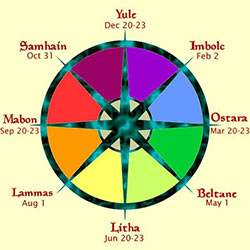
THE PAGAN WHEEL of the year is comprised of eight Sabbats or holidays. They are the two solstices, the two equinoxes and the four points or cross-quarters in-between. While the symbology contained within each observance is drawn from ancient European cultures, most of what is considered modern pagan practice was co-opted from scholarly works by a few key authors beginning in the early 1900s.
Therefore, the Sabbat of Yule, as we understand it, is not necessarily a more authentic holiday than Christmas, and the Pagan Wheel of the Year could be considered about as historically accurate as eating marshmallow peeps on Easter.
Celebration of a “Holy Day” for many people is a day of family tradition, cultural inheritance and religious teachings. Personally, I struggle with celebrating any of the holidays — Pagan, Christian, or otherwise. As an American, raised by a single mother, living miles away from any extended relatives, I was instilled with the idea that consumer culture was the red-headed stepchild of a corrupt religious system based on myths that no longer apply.
For this reason, I’ve had just as hard of a time adopting Pagan “traditions” for the same reasons my parents abandoned their Christian ones. I have attended many rituals and open Sabbats in the hopes of experiencing something visceral, only to be disappointed as the ceremony fell flat.
Part of the appeal of Paganism is the idea of continuity from ancient times; it represents a cultural heritage from Europe that predates the religious intrusion from Rome. It offers symbols, myths and deities that come with a set of guiding morals and principles that are distinctly different from the Abrahamic religions. The practices of Paganism are grounded in earthly and seasonal occurrences. The ground beneath our feet, the wind in our hair, the fire in the hearth, these are the elements that shaped the culture of the ancients.
Observing the wheel of the year is an attempt to connect across time and space to a (dare I say “romanticized?”) culture that takes for granted the things our Industrial Revolution has squandered. But while I could associate colors, deities, food stuffs and activities to certain days of the year, at best it feels like an arbitrary attempt to borrow meaning from a culture foreign to my own. I’ve never been a fan of doing something simply because it is common, accepted, popular or expected. But nowhere in my upbringing was there a successful replacement, or an instillment of value for what most families take for granted.
The wheel of the year offers guidance that anchors one to the turning of the seasons. Part of living a magical life is stopping to observe what is happening around you and connecting with others who see and value the same things. There is power in shared observances. But I also believe we could be losing more than we gain when we gather for the sake of manufactured traditions that are based on cultures we will never experience firsthand.
For example, February 2 is the Sabbat Imbolc (pronounced IM-olk). Imbolc is a Gaelic word meaning “in the belly.” It was named for the time when ewes were giving birth. It represents new life, and the sacrament is milk. While this may be relevant for sheep herders, there is absolutely nothing in my life that correlates. I could take the abstracted view and say it’s a time to hold the vision of spring, and new life to come. This view falls more in line with Candlemas, the Christian holiday that is observed on the same day.
In my opinion, the purpose of rituals, ceremonies and holidays is to celebrate a common bond and express it through a shared activity. One of the common complaints I hear about American holidays is, “Why do you need a specific day to tell someone you love them, give them a present, or light a candle in remembrance?”
My answer is: You don’t, but opting out of communal celebrations can leave you feeling just as empty, and as far as I can tell, nothing more meaningful has come along…yet.









